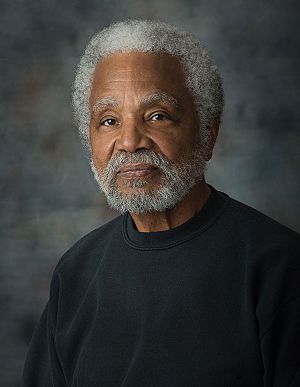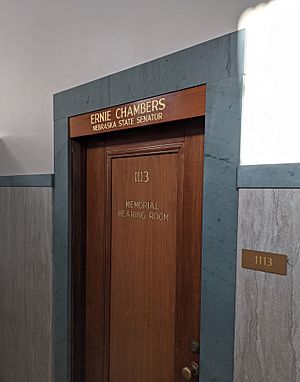Ernie Chambers facts for kids
Quick facts for kids
Ernie Chambers
|
|
|---|---|

Ernie Chambers as a Nebraska Senator
|
|
| Member of the Nebraska Legislature from the 11th district |
|
| In office January 9, 2013 – January 6, 2021 |
|
| Preceded by | Brenda Council |
| Succeeded by | Terrell McKinney |
| In office January 6, 1971 – January 7, 2009 |
|
| Preceded by | George W. Althouse |
| Succeeded by | Brenda Council |
| Personal details | |
| Born |
Ernest William Chambers
July 10, 1937 Omaha, Nebraska, U.S. |
| Political party | Independent |
| Other political affiliations |
New Alliance (1988) |
| Residences | Omaha, Nebraska, US |
| Alma mater | Creighton University (BA, JD) |
Ernest William Chambers (born July 10, 1937) is an American politician and civil rights activist. He represented the 11th District of North Omaha in the Nebraska Legislature for a total of 46 years. His first term was from 1971 to 2009, and his second was from 2013 to 2021.
Chambers is the longest-serving state senator in Nebraska's history. For most of his time in office, he was the only nonwhite senator. He was the first African-American to run for governor and for the United States Senate in Nebraska. For many years, he was also the only openly atheist member of any state legislature in the United States.
Contents
Early Life and Education
Ernest Chambers was born in Omaha, Nebraska. His father was a minister, and his mother's family came from Louisiana. He grew up with six brothers and sisters in the Near North Side neighborhood.
He graduated from Omaha Tech High School in 1955. He then went to Creighton University, where he earned a degree in history in 1959. He also studied Spanish and philosophy. Later, he attended Creighton's law school and finished his law degree in 1979.
Early Career and Activism
When he was 25, Chambers worked for the Omaha Post Office. He said he was fired for speaking out against unfair treatment of Black employees. He protested by holding a sign that said, "I spoke against discrimination in the Omaha Post Office and was fired."
In the summer of 1966, there were riots in Omaha. Chambers acted as a voice for the community. He met with the mayor and helped calm the situation. He became a well-known leader in North Omaha, fighting for the rights of young African-Americans. At the time, he was working as a barber. He appeared in a 1966 documentary film called A Time for Burning, where he discussed race relations in the city.
A Long Career in the Nebraska Legislature
After trying for other positions, Chambers was elected to the Nebraska Legislature in 1970. He represented North Omaha's 11th District. He was re-elected many times, serving until 2009. Because of term limits, he had to leave office. But he was able to run again after four years and won his seat back in 2012, serving until 2021.
On April 25, 2005, Chambers became the longest-serving state senator in Nebraska's history.
Fighting Against Apartheid in South Africa
In 1980, Chambers introduced a resolution to protest apartheid, a system of racial segregation in South Africa. Because of his efforts, Nebraska became the first U.S. state to sell its investments in companies doing business with South Africa.
Other states and the U.S. government later followed Nebraska's lead. This pressure helped end apartheid. When Archbishop Desmond Tutu, a famous South African leader, visited Nebraska, he said the state had helped free his country.
Challenging Prayer in Government
In 1980, Chambers filed a lawsuit to stop the Legislature from starting its sessions with a prayer paid for by the state. He argued it was against the U.S. Constitution. The case, called Marsh v. Chambers, went all the way to the U.S. Supreme Court. In 1983, the Supreme Court decided that the prayer was allowed because of the country's "unique history."
Supporting Student Athletes
Since the 1980s, Chambers has argued that college athletes should be treated like employees. He said they make a lot of money for their universities but don't get paid for it. A bill he supported was passed in 2003. It allows universities to pay student athletes a stipend, which is a small, regular payment.

Protecting Equal Rights
Chambers has been a longtime supporter of the LGBT community. In 1993 and 1995, he introduced bills to stop employers from discriminating against people based on their sexual orientation. Even though these bills did not pass, he continued to support similar laws throughout his career.
The 2007 Lawsuit Against God
In 2007, some lawmakers wanted to stop people from filing lawsuits that seemed silly or had no real purpose. Chambers believed everyone should have the right to go to court. To make his point, he filed a lawsuit against God.
The lawsuit was a way to show that the courts must be open to everyone. It was dismissed because the court couldn't deliver a notice to God. Chambers said that since God knows everything, God was already aware of the lawsuit.
Working to End the Death Penalty
Chambers is strongly against the death penalty. For over 40 years, he introduced a bill to end capital punishment in Nebraska.
In 2015, his bill finally passed, even after the governor tried to stop it. However, a statewide vote was held in 2016. The people of Nebraska voted to keep the death penalty.
Other Important Work
- Protecting Wildlife: Chambers often fought to protect animals like black-tailed prairie dogs and mountain lions from being hunted.
- Women's Rights: He has long supported feminist goals. In 1975, he helped pass a law that made Nebraska the first state to outlaw a husband from harming his wife.
- Stopping a Pipeline: In 2015, he introduced a bill to oppose the Keystone XL pipeline project.
- Preserving Voting Rules: In 2016, he helped keep Nebraska's system of splitting its electoral college votes. Because of this, one of Nebraska's votes went to Joe Biden in the 2020 presidential election.
Community Involvement
- Chambers hosted a weekly TV show on a local public access channel.
- He wrote a column for the Omaha Star, a newspaper serving the African-American community.
- He often sends out "Erniegrams" to other lawmakers. These are typed poems, articles, and cartoons about current events.
Legacy and Personal Life
Chambers is known as a powerful voice for civil rights in Nebraska. He has been called "the Maverick of Omaha" and a "Defender of the Downtrodden."
In his honor, an apartment complex was renamed Ernie Chambers Court. A meeting room in the Nebraska Capitol building was also named the Ernie Chambers Memorial Hearing Room.
Chambers is known for his casual style, often wearing jeans and a sweatshirt in the legislature. He is also a talented sketch artist. He was married and has four children.
Views on Religion
Chambers is an atheist, which means he does not believe in God. He often quotes from the Bible in his speeches, which he jokingly calls "the Bibble." For a long time, he was the only openly atheist state lawmaker in the entire country.
See also
- African Americans in Omaha, Nebraska
- Civil rights movement in Omaha, Nebraska
- List of riots and civil unrest in Omaha, Nebraska
- History of North Omaha, Nebraska
- Timeline of racial tension in Omaha, Nebraska
- Timeline of North Omaha, Nebraska history
- History of Omaha, Nebraska
- List of African-American United States Senate candidates


